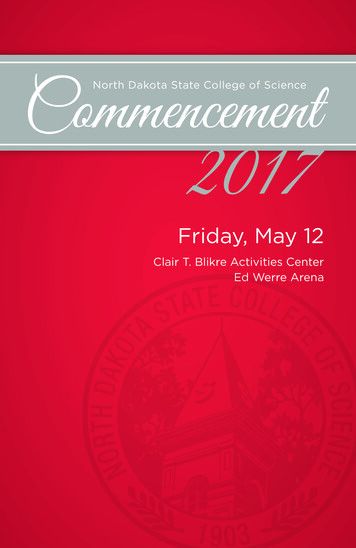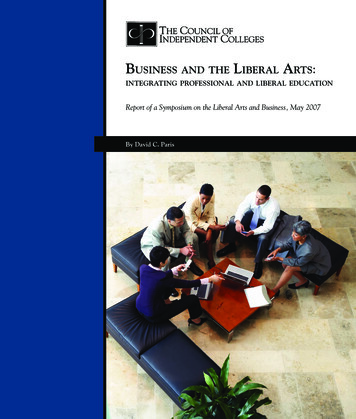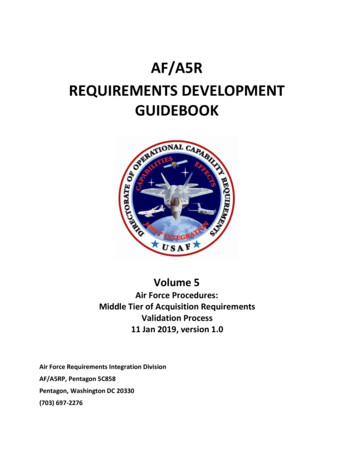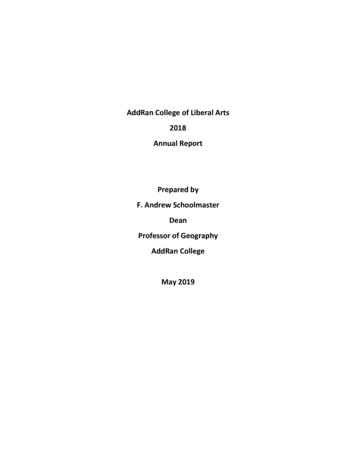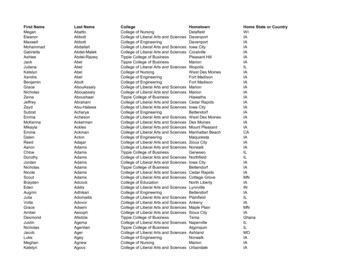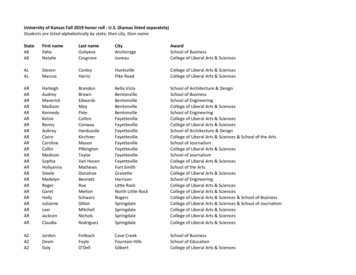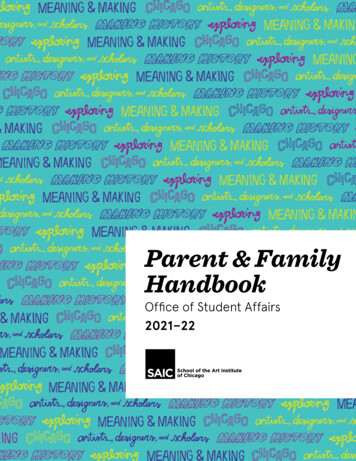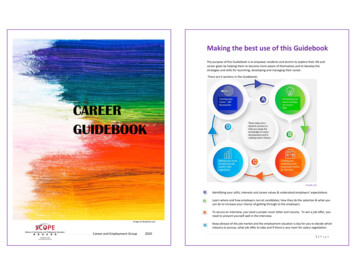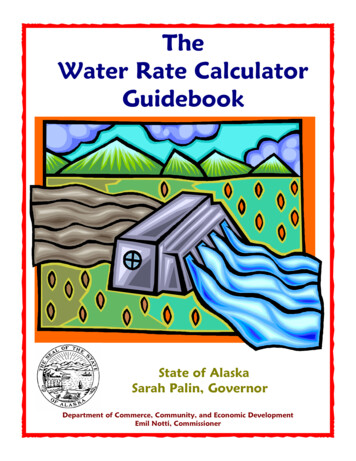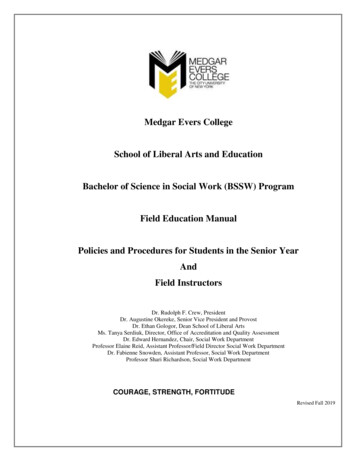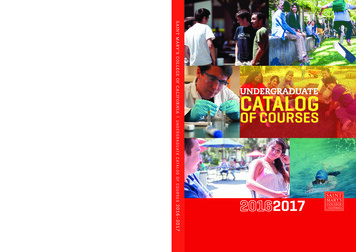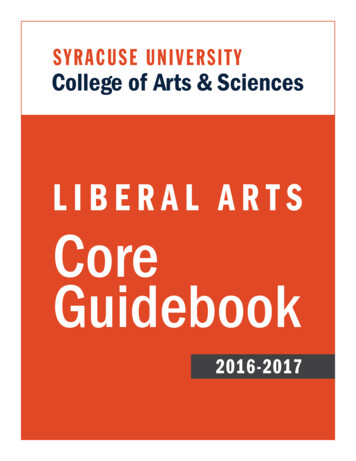
Transcription
College of Arts & SciencesLIBERAL ARTSCoreGuidebook2016-2017
LIBERAL ARTS COREThe Liberal Arts Core is required of all students singly enrolled in the College of Arts andSciences and of all students dually enrolled in the College and the Newhouse School ofPublic Communications or School of Education with one exception.Though the Liberal Arts Core is required of all students dually enrolled as first yearstudents in the College and the Newhouse School of Public Communications, studentswho transfer to the dual program after their first year as singly enrolled students in theNewhouse School will satisfy general requirements for the dual degree program bycompleting the Newhouse Core Requirements.DOUBLE COUNTING RULEPertaining to courses that can count toward multiple majors and minors the followingrestrictions apply. In the following restrictions, “uniquely counting” means counting towardthe completion of only one major or minor.a. In order to be awarded a minor in a program: A student must earn at least6 upper division credits uniquely counting toward the minor.b. In order to be awarded a BA in a program: A student must earn at least12 upper division credits uniquely counting toward the BA.c. In order to be awarded a BS in a program: A student must earn at least15 upper division credits uniquely counting toward the BS.d. In the case of the Integrated Learning Majors, a student must earn atleast 12 upper division credits uniquely counting towards the BA or BS.
Welcome to the College of Arts and Sciences, the intellectual heart and soulof Syracuse University! The Liberal Arts Core Guidebook you are holding inyour hands will help you plan your career to make full use of the resourcesprovided to you by the College, to help you become a leader of tomorrow.We believe that a liberal arts education will help students reach their fullpotential by providing an education that is based on the principles ofcritical thinking, effective communication, and the analysis andunderstanding of data. Your experiences with the Liberal Arts Core willprepare you to assume your leadership role in society, just as today’sleaders derive strength from their liberal arts education.During your journey through the Liberal Arts Core, you will study subjectsthat are familiar as well as those that are totally new to you. Collectively,the courses you select will enable you to appreciate the diversity andrichness of the peoples, cultures, and natural processes in the world aroundyou. It is the exposure to many different subjects that enables students inour College to make a difference. Daily, our students are accomplishingincredible things and leading change; all their actions are rooted in theirArts & Sciences education.Your assigned College Advisor, and the entire advising team in the College’sOffice of Advising and Career Services are here to help you understand theCore and connect your studies in the liberal arts with your major, careeropportunities or continued study in graduate and post-baccalaureateprofessional programs. I encourage each of you to make an appointmentwith your College Advisor to discuss questions, concerns and createacademic plans to meet your goals. Call (315) 443-3150 to make anadvising appointment, or visit 323 Hall of Languages for a drop-in with anymember of the advising team.I offer my sincere congratulations on the achievements that have broughtyou into the College of Arts and Sciences and wish you bon voyage on thejourney you are about to begin!Karin RuhlandtDean
THE LIBERAL ARTS CORE GUIDEBOOK2016-2017TABLE OF CONTENTSINTRODUCTIONOutline of The Liberal Arts CoreThe Liberal Arts CoreFirst Year Forum and First Year LectureDiversityNotes for Students with Advanced Placement CreditNotes for Transfer StudentsI. LIBERAL SKILLS REQUIREMENTA. Writing Skills1. Studios One and Two2. The Writing-Intensive Requirement2345689101011B. Language Skills14C. Quantitative Skills16II. DIVISIONAL PERSPECTIVES REQUIREMENT18A. The Humanities Division19B. Natural Sciences and Mathematics23C. The Social Sciences Division25III. CRITICAL REFLECTIONS ONETHICAL AND SOCIAL ISSUES REQUIREMENT32COURSE DESCRIPTIONS FOR THE LIBERAL ARTS CORE38INDEX OF COURSES71Table of Contents 1
LIBERAL ARTS CORE CURRICULUMCOLLEGE OF ARTS AND SCIENCESI. Liberal Skills RequirementWriting SkillsStudio 1: Practices ofAcademic WritingWRT 105WRT 109or3 Courses (8 to 10 credits)A Writing-Intensive CourseAn approved course inany subject (which maysimultaneously satisfyother requirements)Studio 2: Critical Researchand WritingWRT 205WRT 209orENL 213 AdvancedAcademic Writing andResearch for Non-NativeSpeakers of EnglishFirst Year SeminarCAS 100orENL 211 Composition forNon-Native Speakers of Englishand eitherLanguage Skills1-3 Courses(4-12 credits)Up through courses numbered 201Quantitative SkillsOr2 Courses(6 to 8 credits)Second course may simultaneouslysatisfy other requirementsII. DIVISIONAL PERSPECTIVES REQUIREMENTHumanities4 Courses (12 credits)At least four courses from the list for the Division including a 2-Course SequenceandNatural Sciences and Mathematics4 Courses (12 to 16 credits)At least four courses from the list for the Division including a 2-Course Sequence and one labcourseandSocial Sciences4 Courses (12 credits)At least four courses from the list for the Division including a 2-Course SequenceIII. CRITICAL REFLECTIONS ON ETHICAL AND SOCIAL ISSUES REQUIREMENTTwo courses approved for this purpose in any subject(6 to 8 credits)These courses may also satisfy Writing-Intensive, Divisional and/or Major or MinorRequirements2
THE LIBERAL ARTS COREAdvising and Career Services encourages all students in the College to meet an AcademicCounselor to discuss questions, concerns and create academic plans to meet your goals. Call (315)443-3150 to make an advising appointment, or visit 323 Hall of Languages for a drop-in. Wewelcome you!A. LIBERAL ARTS EDUCATIONAn education in the liberal arts should do at least two essential things:·help students to reach a university-level mastery in the most fundamental intellectual skills needed both toexplore the world and for effective communication and expression: the use of language and the use ofquantitative methods.·help students to develop broad and integrating perspectives on the world and human experience, perspectivesthat draw upon the best of scholarship and research from across the fields of liberal learning. This is done byintroducing students to a variety of important parts of the universe of learning and helping them to draw uponand become members of the universal community of learners.B. THE PARTS OF THE COREThe Liberal Arts Core is a set of principles that guides students in the selection of courses and serves todefine the common core of a liberal arts education at Syracuse. It was devised and adopted by the faculty of theCollege of Arts and Sciences to assure that each student's course of study includes the most important features ofan education in the liberal arts. There are three fundamental parts to the Liberal Arts Core:I. The Liberal Skills RequirementII. The Divisional Perspectives RequirementIII. The Critical Reflections on Ethical and Social Issues RequirementThe Liberal Skills Requirement assures that each student further develops the fundamental intellectual skill ofeffective writing and gives the student a choice of whether to satisfy a competency requirement in quantitativeskills or a second language.The Divisional Perspectives Requirement introduces students to something of the great range of liberal fields ofinquiry. A liberal education is essentially an education from a diversity of viewpoints. An education is not "free"if it confines students to one or two viewpoints, one field of study, or focuses narrowly on a single professionalobjective. The disciplines and interdisciplinary studies that constitute the universe of the liberal arts and sciencesboth complement and compete with each other in the effort to gain the most informed, balanced, and integratingperspectives on the world and human experience. Students need to get a sense of the range and power of liberalstudies, and of the controversies and uncertainties that remain a challenge for these studies. In the course ofsurveying something of this range, they will also be put in a better position to make an informed choice regardingtheir majors and minors.The Critical Reflections on Ethical and Social Issues Requirement is designed to assure that students reflectupon the relevance of the liberal arts and sciences to ethical and social issues. Every liberal field of study has greatethical and social significance. The courses that satisfy this requirement build on that fundamental fact in order tohighlight that significance and to develop in students critical and self-critical intellectual habits of thought.LIBERAL ARTS CORE 3
FIRST YEAR FORUMANDTHE FIRST YEAR LECTUREThe First Year Forum and the First Year Lecture give students entering the College of Arts andSciences an innovative, common introduction to the College and to studies in the Liberal Arts.The First Year Forum, CAS 101, is a one-credit seminar required of all First Year Students whoare not in the Honors Program, designed to orient students to the university and to studies in theCollege of Arts and Sciences. A Forum is led by a regular member of the faculty who has volunteeredto lead a seminar of 15 students. Frequently the faculty member is also the student’s academicadvisor. Faculty members meet with their Forum once a week for the first 8 to 9 weeks of thesemester for discussions that range from important intellectual issues to significant problems ofadjustment to the university. The content of each Forum varies from section to section and isdetermined by each Forum Leader, who may involve the students in some of the choices of topicsand activities. There are, however, common elements across the Forum seminars. Forum Leaderstake their students to dinner and together they attend some local cultural event – the symphony, aplay, a museum exhibit. Forum sections will attend the First Year Lecture together and incorporatediscussion of it in their seminar meetings. Among the major purposes of the Forum is to make surestudents get to know a faculty member personally and in some context other than that of anacademically specialized course. Another major purpose is to see that faculty members are gettingto know first year students in a deeper way than is usually possible in regular courses. All first yearstudents in the College are required to participate in a First Year Forum.The Milton First Year Lecture was established in the College of Arts and Sciences to provide aunique focal point for the introduction of students to the College. The lectureship brings a nationallyprominent speaker to campus early each fall to address the first year students of the College of Artsand Sciences at the beginning of their university studies. The lecture provides an opportunity to bringour students together to highlight the importance of their common undertaking as students in theLiberal Arts and stimulates them to academic achievement. The topic of the First Year Lecture willprovide a common intellectual theme for discussion in the Forum seminars – a theme of particularimportance to students and scholars in the Liberal Arts.4
DIVERSITY AND THE LIBERAL ARTS CURRICULUMDIVERSITY is one of the University’s five core values. In a college curriculum a commitment to diversity meansa commitment to studies that help students to understand the variety of peoples, social groups and cultures thatsurround, affect, challenge and enrich them. It also seeks to help each student gain an informed and criticalunderstanding of her or his own social and cultural background by setting it in the context of the backgrounds ofothers. Liberal education has always promoted the understanding of people of other kinds, times and cultures, butit is only in recent times that the full implications of that ideal have been recognized. Traditionally, a limitedselection of social groups and cultures other than those dominant in a society were considered in a liberal courseof study, but not a sufficiently rich array was included to allow an adequate, critical understanding of humandiversity.Several departments of the College have explicit missions to provide studies of women, ethnic minorities of theUnited States, and cultures other than those of Great Britain and Anglo-America. These departments include: African American StudiesAnthropologyLanguages, Literatures and Linguistics (including Arabic, Chinese, French, German, Greek, Hebrew,Hindi, Italian, Japanese, Kiswahili, Korean, Latin, Persian, Polish, Russian, Spanish, Turkish)GeographyHistoryPolitical ScienceReligionSociologyWomen’s and Gender StudiesIn addition to these departments, the College of Arts and Sciences is the home of several interdisciplinaryprograms offering majors or minors that bring specific focus on groups and cultures that expand ourunderstanding of human diversity: Asian / Asian AmericanForensic ScienceGlobal Political EconomyGlobal Security StudiesInternational RelationsJewish StudiesLatino-Latin American StudiesLesbian, Gay, Bisexual, and Transgender StudiesMiddle Eastern StudiesNative American StudiesReligion and SocietySouth Asian StudiesThese departments and programs, along with others, offer over 50 undergraduate courses on US ethnicminorities, over 45 courses on women’s issues and over 200 courses on cultures and societies outside of GreatBritain and Anglo-America. We encourage students to take full advantage of this rich diversity within thecurriculum.A special feature of the Liberal Arts Core called the Critical Reflections on Ethical and Social IssuesRequirement also directs students to courses in which issues and topics concerning human diversity are studied(see the section on this requirement later in this Guidebook).LIBERAL ARTS CORE 5
SPECIAL NOTE FOR STUDENTS WITH ADVANCED PLACEMENT CREDITIf you have received the score required on one of these C.E.E.B. Advanced Placement examinations, you willreceive credit for the appropriate Syracuse University course(s) and may apply those credits earned towardcompleting the Liberal Arts core according to this chart.Note: A maximum of 30 semester hours of credit may be accepted from all forms of extra-institutional andexperiential learning, and examination programs (including Syracuse University Advanced Credit Examinations).ADVANCEDPLACEMENT COURSESCOREREQUIREDArt History3Biology4EQUIVALENT LIBERAL ARTS CORECOURSENo. ofCreditsEnglish Language andCompositionEnglish Literature andCompositionEnvironmental Science4HOA 105-106 and counts as a sequence inHUMANITIESBIO 121,123,124 and counts as a sequence and lab inNATURAL SCIENCES AND MATHEMATICSCHE 103 in NATURAL SCIENCES ANDMATHEMATICSCHE 106/116 and CHE 107/1171 and counts assequence in NATURAL SCIENCES ANDMATHEMATICSWRT 105-2054ETS 151 or 152 or 153 or 117 or 1182 and WRT 105633Human GeographyEuropean History44United States History4World History4Economics: MicroeconomicsEconomics: Macroeconomics44EAR 200 in NATURAL SCIENCES ANDMATHEMATICSGEO 105 or GEO 171in SOCIAL SCIENCESHST 111-112 and counts as a sequence inHUMANITIESHST 101-102 and counts as a sequence in SOCIALSCIENCESHST 121, 122 and counts as a sequence in SOCIALSCIENCESECN 101 in SOCIAL SCIENCESECN 102 in SOCIAL SCIENCESMathematics: Calculus AB33Exemption from QUANTITATIVE SKILLS andsubstitute for MAT 285 in NATURAL SCIENCESAND MATHEMATICSExemption from QUANTITATIVE SKILLS andsubstitute for MAT 285 & 286 or MAT 295 inNATURAL SCIENCES AND MATHEMATICS3Chemistry3,454Mathematics: Calculus BC44Exemption from QUANTITATIVE SKILLS andsubstitute for MAT 295-296 in NATURALSCIENCES AND MATHEMATICS683863666336 or 481Pre-medical students should consult with Health Professions Advising before accepting AP chemistry creditEnglish: Literature and Composition – If you score a 4 or better on the examination in Literature and Composition,you will receive three credits for ETS 151. Should you subsequently elect to take ETS 151, you will be able to transferthe credit to one of the following: ETS 152, 153, 117 or 118. In addition you will also receive three credits for WRT 105for a total of six credits.3 Students cannot be awarded credit for both MAT 295 and for MAT 285-286. While MAT 295 is usually the mostappropriate choice, speak to your faculty/academic advisor about which is appropriate for your program.4Students cannot be awarded credit for both MAT 295 and for MAT 285-286. While MAT 295 is usually the mostappropriate choice, speak to your faculty/academic advisor about which is appropriate for your program.26
Mathematics: Level II(Exams Taken in Puerto Rico)Music Theory4Exemption from QUANTITATIVE SKILLS andsubstitute for MAT 285 in NATURAL SCIENCESAND MATHEMATICSExemption from QUANTITATIVE SKILLS andsubstitute for MAT 285 & 286 or MAT 295 inNATURAL SCIENCES AND MATHEMATICSMAT 194 in QUANTITATIVE SKILLS3HOM/MTC 125 awarded for non majors only3Physics I34Physics II3Physics B3Physics C (Mechanics)3Physics C (Electricity andMagnetism)3Substitute for PHY 101 in NATURAL SCIENCESAND MATHEMATICSSubstitute for PHY 102 in NATURAL SCIENCESAND MATHEMATICSPHY 101-102 and counts as a sequence inNATURAL SCIENCES AND MATHEMATICSSubstitute for PHY 101 or PHY 211 (221) inNATURAL SCIENCES AND MATHEMATICSSubstitute for PHY 102 or PHY 212 (222) inNATURAL SCIENCES AND MATHEMATICSPsychology4PSY 205 in SOCIAL SCIENCES3Statistics3United States Government andPoliticsComparative Government andPolitics4MAT 121 or 221, or STT 101 in QUANTITATIVESKILLSPSC 121 in SOCIAL SCIENCES4PSC 123 in SOCIAL SCIENCES3Chinese Language and Culture34CHI 102 in LANGUAGE SKILLSCHI 201 in LANGUAGE SKILLS44French Language and Culture3FRE 102 in LANGUAGE SKILLS4German Language and Culture3GER 102 in LANGUAGE SKILLS4Italian Language and Culture3ITA 102 in LANGUAGE SKILLS4Japanese Language and Culture34JPS 102 in LANGUAGE SKILLSJPS 201 in LANGUAGE SKILLS44Latin345LAT 102 in LANGUAGE SKILLSLAT 201 in LANGUAGE SKILLSLAT 201 and LAT 320 (Language Skills andHumanities)447Spanish LanguageSpanish Literature334SPA 102 in LANGUAGE SKILLSSPA 102 in LANGUAGE SKILLSSPA 201 in LANGUAGE SKILLS444Mathematics: Calculus AB Subscore Grade – BC Exam43436 or 4448443 or 43Languages:If you decide to take the equivalent Syracuse University course for which you have been awarded AdvancedPlacement or Transfer Credit, the AP or Transfer Credit WILL BE DELETED and you will lose the credit.If you have questions, contact Advising and Career Services in 323 Hall of Languages.International Baccalaureate Program - Arts and Science students who have completed courses in the IBProgram should contact Advising and Career Services in 323 Hall of Languages regarding credit towardcompleting the Liberal Arts Core.LIBERAL ARTS CORE 7
SPECIAL NOTE FOR STUDENTS ENTERING THE COLLEGE WITHAN A.A. OR A.S. DEGREEStudents who have earned college credit before enrolling in Syracuse University, and intra universitytransfers into the College of Arts and Sciences from schools and colleges that did not require the LiberalArts Core, should make sure that their transcripts are evaluated by the Office of Advising and CareerServices and that their previous work is evaluated in the context of the Liberal Arts Core.The following applies to students in the College of Arts and Sciences.In evaluating a transfer student’s prior credits as they apply toward the Liberal Arts Core requirements,the College will handle them as follows:A.A. or A.S. Completed ElsewhereStudents transferring to Syracuse who have earned an Associate of Arts (A.A.) or Associate of Science(A.S.) degree shall be required to complete the Liberal Skills and Critical Reflections Requirements of theLiberal Arts Core. Based upon prior course work such students are required to successfully complete fourcourses in one of the Liberal Arts Core Divisional Perspective Requirements (Humanities: NaturalSciences and Mathematics; Social Sciences) and successfully complete at least two courses from the listin each of the other two Liberal Arts Core Divisional Perspective Requirements (Humanities; NaturalSciences and Mathematics; Social Sciences), including the completion of at least one natural sciencelaboratory course.Note: Transfer credit is not accepted for Writing Intensive and Critical Reflections requirementsexcept when completed within an Associates Degree as defined in articulation agreements.8
PART ITHE LIBERAL SKILLSREQUIREMENTQuantitative skill and skill in the use of languages are indispensable elements in liberal and generaleducation. The importance of these skills does not diminish after graduation. They are abilities that are inconstant need throughout our lives - for professional success, for effective and informed citizenship, andto enable us to enjoy and to contribute to the cultural and intellectual riches that depend upon them.To satisfy the Liberal Skills Requirement of the Liberal Arts Core, students are required to achieveproficiency in writing by successfully taking either WRT 105, WRT 109, CAS 100 or ENL 211; and WRT205, and a special writing-intensive course prior to taking WRT 205, WRT 209 or ENL 213.The remainder of the requirement gives students the option of demonstrating a university-levelcompetence in either a language other than English, orthe use of quantitative methods to understand and solve problems.LIBERAL ARTS CORE 9
SECTION ATHE WRITING SKILLS REQUIREMENTStudents satisfy the Liberal Skills Requirement in Writing by successfully completing three courses. The first of these courses ischosen from Writing Studio 1: Practices of Academic Writing (WRT 105) or First Year Seminar (CAS 100*) or ENL 211Composition for Non-Native Speakers of English. During the second year, students will take the higher level Writing Studio 2:Critical Research and Writing (WRT 205) or Advanced Academic Writing and Research for Non-Native Speakers of English(ENL 213). Before WRT 205 or ENL 213 is taken, students will take a Writing-Intensive course in a subject matter other thanwriting a course that has been specially designed to give attention to developing writing ability while studying another subjectmatter. The list of approved, Writing-Intensive courses will be found in the next section. These courses that fulfill the WritingIntensive Course requirement must be successfully completed by the student in the academic year in which they are listed in theLiberal Arts Core Guidebook.1. WRITING COURSESCAS 100*, WRT 105 and WRT 205 introduce students to the kinds of writing, reading, and critical thinking that are practiced in auniversity and expected throughout the curriculum. Students write frequently, in varied forms, for varied purposes of inquiry andinstruction. Students whose native language is not English satisfy the requirement by completing ENL 211 and 213. Additional studyof English may be necessary for a student prior to entering ENL 211.Students will take WRT 105 or CAS 100* in the fall or spring of their first year and WRT 205 in the spring of their sophomore year.WRT 109, CAS 100*/HNR, and WRT 209 are intensive versions of the three writing courses for students in the Honors Program.ENL 211 and 213 satisfy the requirement for students whose native language is not English. Alternatives are listed below.CAS 100* First Year Seminar (3 CREDITS)Interdisciplinary courses on a designated topic providing an in-depth writingexperience supported by an academic context. Covers rhetorical strategies, practices, and conventions of writing in the academy,alongside critical reading and research practices.WRT 105 Studio 1: Practices of Academic Writing (3 CREDITS) Study and practice of writing processes, including criticalreading, collaboration, revision, editing, and the use of technologies. Focuses on the aims, strategies, and conventions of academicprose, especially analysis and argumentation.WRT 205 Studio 2: Critical Research and Writing (3 CREDITS)Study and practice of critical, research-based writing,including research methods, presentation genres, source evaluation, audience analysis, and library/online research. Students completeat least one sustained research project.WRT 109, 209 Studio 1 and 2 (HONORS) (3 CREDITS EACH) These courses are honors versions of WRT 105 and 205 forstudents of demonstrated exceptional ability. WRT 109 is a prerequisite for WRT 209.ENL 211 Composition for Non-Native Speakers of English (3 CREDITS) Expository writing and reading. Students developan awareness of the cultural and discourse expectations in written English, through reading and responding to articles on a variety oftopics and writing essays of increasing complexity.ENL 213 Advanced Academic Writing and Research for Non-Native Speakers of English (3 CREDITS) Development ofcritical reading and thinking skills used in scholarly research in a variety of disciplines. Students learn to summarize, synthesize,critique, and document, and use library resources effectively.EXEMPTIONS AND ALTERNATIVESAdvanced Placement. Students who achieve a grade of 4 or 5 on their CEEB Advanced Placement Exam in Literature andComposition may register for WRT 205. Students who achieve a grade of 4 or higher on the CEEB Advanced Placement Exam inLanguage and Composition are not required to complete WRT 105 or WRT 205.Project Advance. Students who have completed WRT 105 and English and Textual Studies (ETS) 141 through SyracuseUniversity’s Project Advance have earned 6 credit hours. To complete the LIBERAL SKILLS in Writing requirement, these studentsshould take WRT 205 in their sophomore year.Transfer Credit. Course work completed at another college or university will be evaluated in a manner consistent with informationprovided in the Transfer Student section of this Guidebook (see page 8). Transfer credit however is not accepted for the WritingIntensive requirement except when defined in articulation agreements.* For students who have not already taken the first writing skills requirement, CAS 100, First Year Seminar, will meet thisrequirement. For students who have fulfilled the first writing skills requirement, CAS 100, First Year Seminar, will meet adivisional requirement and possibly a critical reflections and / or writing intensive requirement as determined by coursecontent.LIBERAL ARTS CORE 10
2. THE WRITING INTENSIVE REQUIREMENTStudents will take a Writing-Intensive course as a prerequisite to taking WRT 205 in their fourth semester. The courses approved forsatisfying this requirement are listed below. Transfer and other credit are not accepted for the Writing Intensive Requirementexcept when they are included in an Associate Degree as defined in articulation agreements.These courses that fulfill the Writing Intensive Course requirement must be successfully completed by the student in the academic yearin which they are listed in the Liberal Arts Core Guidebook.AFRICAN AMERICAN STUDIESAAS 138Writing About Black CultureAAS 233The Caribbean NovelAAS 234African FictionAAS 235African American DramaAAS/WGS 303Black Women WritersAAS 305African OratureAAS 312Pan AfricanismAAS 338Creative Writing WorkshopART AND MUSIC HISTORIESHOA 106 (honors only) Arts and Ideas IIHOA 412The Gothic SpellHOM 363Opera in SocietyHOM 372Music in Multicultural AmericaHOM 485Contemporary Indigenous SoundscapesHOM 493Music and IdentityANTHROPOLOGYANT 185ANT/SAS/WGS 324ANT/GEO/WGS 367Global Encounters: Comparing World Views & Values Cross-CulturallyModern South Asian CulturesGender in a Globalizing WorldEARTH SCIENCESEAR 325Introduction to PaleobiologyENGLISH AND TEXTUAL STUDIESETS 113Survey of British Literature, Beginnings to 1789ETS 114Survey of British Literature, 1789 to PresentETS 115Topics in British Literary HistoryETS 117Survey of American Literature, Beginnings to 1865ETS 118Survey of American Literature, 1865 to PresentETS 119Topics in US Literary HistoryETS 121Introduction to ShakespeareETS 122Introduction to the NovelETS 142Narratives of Culture: Introduction to Issues of Critical ReadingETS 146Reading Screen CultureETS 151Interpretation of PoetryETS 152Interpretation of DramaETS 153Interpretation of FictionETS 154Interpretation of FilmETS 155Interpretation of NonfictionETS 181Class and Literary TextsETS 182Race and Literary TextsETS 184Ethnicity and Literary TextsETS/WGS 192Gender and Literary TextsETS 235Classics of World Literature IETS 236Classics of World Literature IIGEOGRAPHYGEO 155 (honors only)GEO 171GEO 219 (honors only)The Natural EnvironmentHuman GeographiesAmerican Diversity and Unity11
GEO 272GEO 353GEO/ANT/WGS 367World CulturesGeographies of Environmental JusticeGender in a Globalizing WorldHISTORYHST 101, HST 102HST 111HST 112HST 201HST 210HST/MES 318HST 347HST/QSX 348HST 398HST 399American History to 1865; American History Since 1865Early Modern Europe, 1350-1815Modern Europe: Napoleon to the PresentResearch Seminar in HistoryThe Ancient WorldThe Middle East to 1900Modern American Politics Through FictionQueering the Middle Ages?Saints and Sinners in the Middle AgesUtopia and Institution: Early MonasticismINTERNATIONAL RELATIONSIRP/PSC 412Global Governance: The United Nations SystemJEWISH STUDIES PROGRAMJSP/REL 215The Jewish Bible/Christian Old TestamentJSP/LIT/REL 235Travel Narratives and PilgrimagesJSP/LIT/REL 239Jewish Humor and SatireJSP/REL 307The Temple and the Dead Sea ScrollsJSP/REL 316The Torah/ PentateuchJSP/LIT/REL 333Yiddish Literature in TranslationJSP/REL 337Shoah: Responding to the HolocaustJSP/REL 338American JudaismJSP/PHI/REL 435Modern Jewish ThoughtLAW IN THE LIBERAL ARTSLLA 201Elements of LawLESBIAN, GAY, BISEXUAL AND TRANSGENDER STUDIESQSX/REL 323Christianity and SexualityQSX/HST 348Queering the Middle Ages?QSX/REL357Queerly ReligiousLITERATURE IN TRANSLATIONLIT/REL/JSP 235Travel Narratives a
2016-2017 TABLE OF CONTENTS INTRODUCTION Outline of The Liberal Arts Core 2 The Liberal Arts Core 3 First Year Forum and First Year Lecture 4 Diversity 5 Notes for Students with Advanced Placement Credit 6 Notes for Transfer Students 8 I. LIBERAL SKILLS REQUIREMENT 9 A. Writing Skills 10 1. Studios One and Two 10 2.
